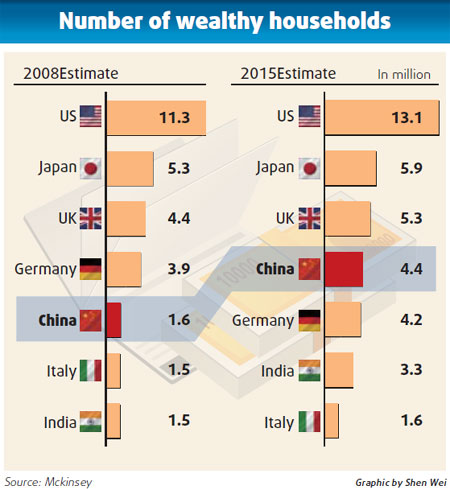The global economic recession is forcing the rich in China to scale down their spending on luxury goods, but it cannot hold back the rapid growth of wealthy households, according to a report released yesterday by global management consultancy McKinsey & Company.
 |
| McKinsey: More rich in China by 2015 [China Daily] |
China is expected to be the world's fourth largest country with wealthy households by 2015, after the US, Japan and the UK. The nation is expected to have more than 4 million wealthy households by then, the report said.
The time is right for international luxury companies to invest in China and cash in on the tremendous opportunities over the next five to seven years, despite the negative short-term impact of the financial crisis, the report said.
The McKinsey research was conducted in the last quarter of 2008 and was based on face-to-face interviews with 1,750 wealthy households from China's 16 cities. The wealthy households, as McKinsey identifies, refer to those having an annual income in excess of 250,000 yuan.
By the end of last year, there were 1.6 million wealthy households nationwide, accounting for less than 1 percent of the total, but the tally will increase by 16 percent annually.
Currently, the wealthy are mainly living in the eastern and southern regions, and around 30 percent are in the top four richest cities - Beijing, Shanghai, Guangzhou and Shenzhen. But McKinsey predicts about three quarters of the growth in the number of wealthy households in five to seven years will be from outside the four regions.
"It's very important for luxury brands to take a quick step in developing the second-tier market," said Vinay Dixit, senior director, McKinsey Asia Consumer Centers.
The most striking finding, according to McKinsey, is that the Chinese wealthy are much younger than those from the US and Japan, with about 80 percent under 45, compared with 30 percent in the US and 19 percent in Japan. They are usually much better educated than other Chinese consumers and most of them are self-employed.
"The products or services that the global players provide here need to fit younger Chinese wealthy consumers, while keeping a consistent global brand positioning," said Dixit.
Of the 1.6 million wealthy households, about 50 percent were not rich four years ago, and McKinsey predicted that more than half of those that will be wealthy by 2015 are yet not today. Over 55 percent of the people surveyed said they had started to use luxury products four years ago.
This is a positive signal. "The consumer expectations on luxury goods are still evolving. Companies have greater flexibility to shape consumer perception and behavior," said Yuval Atsmon, an associate principal from McKinsey Shanghai.
Compared with the common Chinese consumers, the wealthy consumers are keen on buying foreign brands and hi-tech gadgets, and they are willing to pay a premium for high quality products.
(China Daily April 3, 2009)